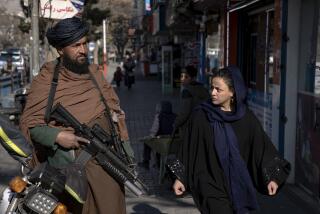Afghan interior minister, top security official resign
- Share via
Reporting from Kabul, Afghanistan, and Washington — Afghanistan’s top law enforcement official and its intelligence chief stepped down Sunday, taking the blame for last week’s attack by Taliban insurgents on a national peace assembly as President Hamid Karzai addressed the gathering.
The resignations of Interior Minister Hanif Atmar and National Directorate of Security Chief Amrullah Saleh came at a time when Afghanistan, faced with an insurgency that continues to intensify, can ill afford instability in its police and intelligence ranks. Saleh had overseen the country’s intelligence agency since 2004, and Atmar, appointed in 2008, was seen as reform-minded and was admired by U.S. officials.
In Washington, several officials expressed concern that the departures could hamper the U.S.-led effort to stabilize Afghanistan on the rapid timetable set by President Obama. “We worked well with both of them, and it will take time for their successors to get fully up to speed, time that we don’t really have,” said a senior official, speaking on the condition of anonymity.
The United States considered Atmar and Saleh two of the most effective ministers in Karzai’s Cabinet. Both had been among the ministers whose reappointment the U.S. supported after Karzai’s reelection last year, the official said. Their removal renewed concern among some U.S. officials that Karzai is a volatile leader capable of rash decisions at odds with Washington’s desires.
Atmar, in particular, had recognized the need for improvements in the Afghan police, which has been plagued by corruption and recruiting problems. Saleh, for his part, had helped rebuild the Afghan intelligence service and was considered as someone in the Afghan government with a clear understanding of the security challenges facing the country.
On the first day of a peace jirga, or assembly, meant as an initial step toward bringing an end to nine years of war, militants tried to break through extensive security cordons and launch suicide bomb and rocket-propelled grenade attacks on the 1,600 delegates.
The attack was thwarted and none of the assembly participants was hurt. However, it proved embarrassing for Karzai, who had to interrupt his opening speech to urge calm as a rocket-propelled grenade landed within 100 yards of the jirga’s tent.
Accepting the resignations, Karzai appointed Atmar’s deputy, Munir Mangal, as acting interior minister and “Engineer” Ibrahim Spinzada as acting intelligence chief.
Afghan law enforcement officials said Sunday that militants were able to rent a house less than a mile from the assembly venue, the Kabul Polytechnic University campus, and bury weapons and arms in the yard a few weeks before the jirga began.
Interior Ministry spokesman Zemari Bashary also said that two militants got past security checkpoints by disguising themselves as a husband and wife with a baby. One of the militants, both male, was in a burka, a head-to-toe garment used by many Afghan women, Bashary said. The militant cradled a rocket launcher swaddled to look like an infant. The strategy took advantage of the fact that a male officer would not search a woman in violation of Afghan customs.
The militants launched at least two rocket-propelled grenades toward the jirga tent before security forces shot and killed them. Four police officers and one member of Karzai’s security detail were injured in the gun battle with the militants, Bashary said.
Bashary also revealed that the Taliban had been planning a much larger attack against the jirga that entailed as many as 14 suicide bombers and three other militants. Nine militants equipped with suicide bomb vests and other weapons were arrested before they could enter Kabul and remain in police custody. Before the jirga started, police also arrested three other insurgents, one of whom was from Tajikistan and another from Russia, who were planning suicide attacks against the assembly.
Karzai on Sunday also took his first step toward carrying out the jirga’s proposal for reconciliation with the Taliban, ordering a review of all imprisoned Taliban suspects and the release of those held on false evidence or unfounded allegations.
The release of suspected insurgents yet to be convicted and believed to be wrongly jailed was one of a series of requests made last week by the three-day assembly of religious, political and tribal leaders.
The assembly’s overarching demand that the government begin negotiations with Taliban insurgents who renounce links to Al Qaeda was accompanied by other measures meant to get militants to join peace talks, including a recommendation that those who agree to lay down their arms be removed from a U.N. terrorism watch list that freezes their assets and restricts their travel.
Karzai ordered the formation of a panel to screen the cases of suspected Taliban detainees. The panel will comprise officials from Afghanistan’s Supreme Court, its Justice Ministry, and a governmental reconciliation commission. The panel, Karzai’s decree stated, will “free those prisoners whose detention is based on inaccurate information or unsubstantiated allegations.”
Hundreds of Taliban suspects are being held in Afghan jails, as well as in U.S. detention facilities in Bagram, Afghanistan, and at the U.S. detention facility in Guantanamo Bay, Cuba. In announcing the order, Karzai did not address whether the U.S. and the North Atlantic Treaty Organization would be consulted before any suspect is freed. His decree also did not specify whether it applied to suspected Taliban insurgents held at U.S. military jails.
However, during an interview with the BBC, the commander of U.S. and NATO forces in Afghanistan, U.S. Army Gen. Stanley McChrystal, said decisions about the potential release of Taliban suspects would be made jointly. McChrystal added that U.S. and NATO forces would be able to provide Afghan officials important background information on detainees’ cases to help determine whether their release is warranted.
Rodriguez reported from Kabul and Cloud from Washington.
More to Read
Sign up for Essential California
The most important California stories and recommendations in your inbox every morning.
You may occasionally receive promotional content from the Los Angeles Times.











